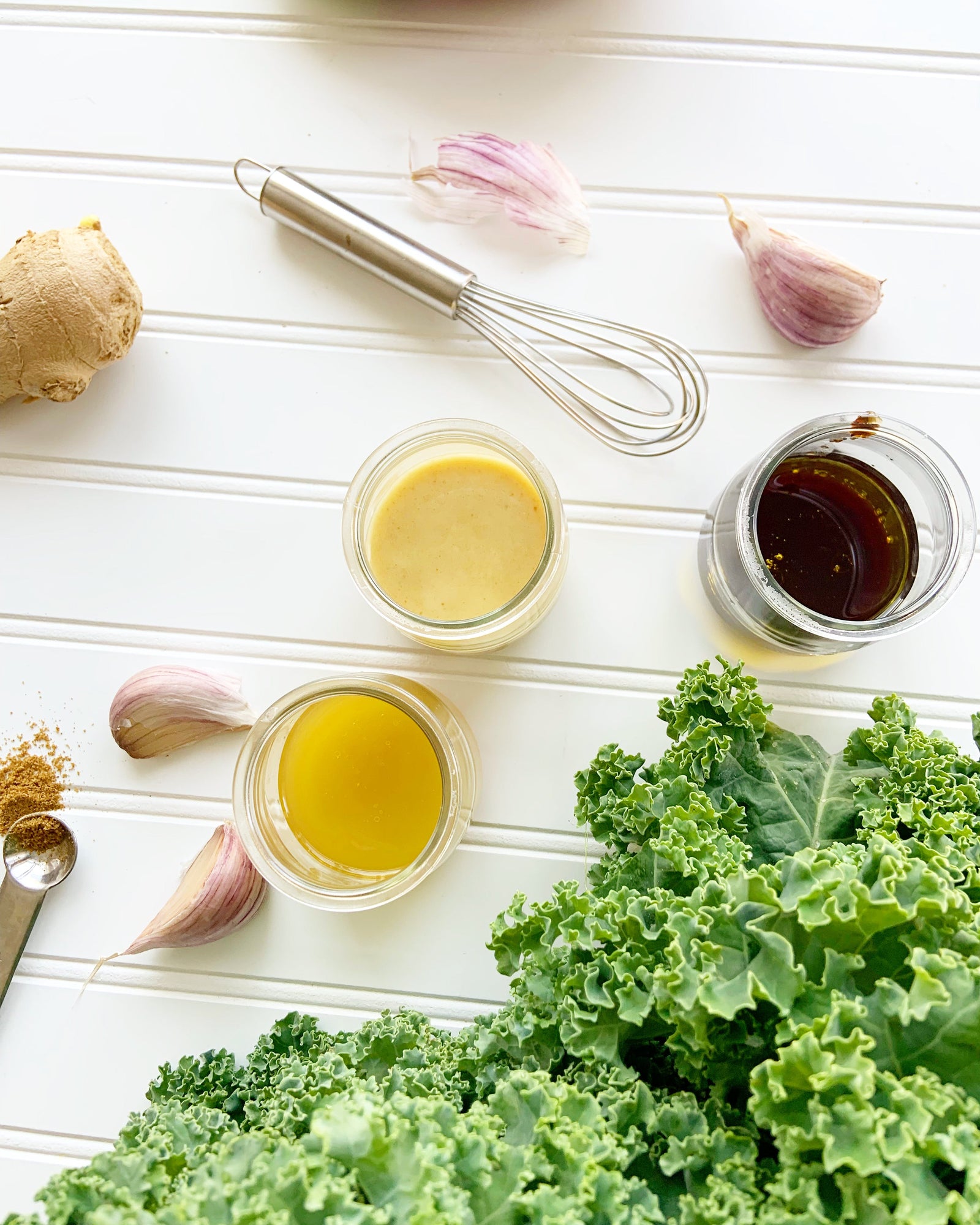It is surprisingly easy to boost your immune system naturally, and avoid getting sick.
You may be surprised by what natural ways scientists have discovered you can boost your immune system. We all know that weak immune systems have a harder time defending against viruses, including snotty common colds, or nasty influenza. Yet, there are natural, easy, everyday habits you can incorporate into your day that can help to strengthen your immune system. From your fork to your pillow, here are 10 natural ways to improve your immunity quickly.
10 Best Ways to Boost Your Immune System Naturally
The best defense might be a good offense when it comes to your health. Your immune system is made up of different parts working together to keep you healthy - sort of like the military having forces specializing in protecting from the ground, air and sea. Despite the complexity of the design, it’s easier to boost your immune system naturally than you may think – no standing on your head required. From eating more chilli peppers to skipping the added salt, here are the 10 best ways to boost your immune system naturally.
10 Natural Ways to Boost Your Immune System
- Eat Chilli Peppers
- Hang Out with Fun-GI
- Be Physical
- Less with the Stress
- Catch Some Rays
- Make Sleep a Priority
- Sidestep Sugar
- Toss the Salt
- Probiotic Rescue
- Invite Ginger to Dinner
1. Eat Chilli Peppers
A mighty spicy way to boost your immune system naturally, chilli peppers are a source of vitamin C known to be an immune-boosting powerhouse. For those of you who prefer foods that don’t make your mouth feel like it is on fire, eating cantaloupe, kiwi, cauliflower, spinach or cranberries are also great ways to get more vitamin C into your body. Vitamin C helps keep the barrier (that mucus layer in your nose and throat) strong so it can keep pathogens out. This helpful nutrient also enhances your white blood cells’ ability to kill bad microbes. Vitamin C is just one of the ways you can boost your immune system naturally. Some of the others might surprise you.
2. Hang out with Fun-GI
Why not invite a fungi to dinner? It’s a delicious way to boost your immune system naturally. Jokes aside, mushrooms are scientifically worthy of being put on your plate. Mushrooms contain vitamin D and fungal polysaccharides, two nutrients known to promote a healthy immune system. Fungal polysaccharides are a type of starch found in mushrooms - human clinical trials show mushrooms help regulate the immune system. For dinner tonight, try going outside your culinary comfort zone and invite nutrient-dense fungi to your dinner plate, such as buttery tasting shitake, or meaty portabella mushrooms. Invite a few fungi to hang out in your kitchen – they add some jazz to your morning omelette, and some flare to your favorite ginger beef stir-fry at dinner.
3. Be Physical
Perhaps one of the best ways you can boost your immune system naturally is to go for a walk outside. Physical exercise, even in small amounts, improves your body’s ability to defend itself. There is a clear relationship between moderate exercise and illness risk. Walking in a forest benefits one’s mood and mental state, according to studies. Since stress weakens your immune system, getting physical outside could be doubly effective at giving your immune system a boost.
4. Less with the Stress
It may be impossible to remove stress from your life completely, but it’s worth trying to reduce it. Stress weakens your immune system. A review of over 30 studies, concluded that chronic stress negatively impacts the immune system. Even short bouts of stress, such as an exam, can supress some immune responses. Stopping to take a deep breath can help manage stress, and thus may be the quickest way to give your immune system a little boost. Other natural ways to reduce stress include:
- reducing caffeine intake
- exercising (particularly outdoors)
- connecting with friends or family
- taking supplements (valerian, ashwagandha, omega-3s)
- writing things down (worries, or what you are grateful for).
5. Catch Some Rays
When your body is exposed to sunlight, it produces vitamin D. Soaking up some sunlight might be the most fun way you can boost your immune system naturally, as vitamin D regulates immune reactions, according to research. How does it do it? Vitamin D is involved in the activation of a type of immune cell, called a T cell. T cells play a role in helping fight infections in the body. For anyone living where sunlight isn’t readily available year-round, you can seek out other sources of vitamin D, such as mushrooms, fortified dairy beverages or supplements.
6. Make Sleep a Priority
Hardly anyone these days gets enough sleep. But, you can’t blame any of us. Between the binge-worthy shows on Netflix, and the addictive apps on our smartphones, it’s easy for those few moments you take to unwind at the end of the day to turn into a late night. But, a lack of sleep can weaken the immune system. Research shows that tired adults are more susceptible to catching a virus, such as the common cold, than those who get the recommended 7 to 8 hours of sleep a night. Can you recall the last time you got 7-8 hours of sleep? One of the best ways to boost your immune system naturally is to make sleep a priority.
9 Best Ways to Get More Sleep Naturally
Getting a good night sleep can play an important role in your overall health, and is one of the best ways to boost your immune system naturally. Here are tips to get more sleep:
- Get exposed to sunlight during the day
- Avoid exposure to blue light later at night
- Aim for a consistent bedtime, and wake time
- Hydrate during the day, avoid drinking too much near bedtime
- Swap out caffeinated drinks for non-caffeinated alternatives after noon
- Create a slumber-inducing environment: dark, cool and cozy
- Skip heavy meals before bed
- Use calming aromatherapy in your sleep space
- Consider melatonin, a natural ingredient known to improve sleep quality
7. Sidestep Sugar
Sugar-coating this isn’t possible: researchers have found when you eat foods that are high in sugar it can interfere with the immune system’s ability to fight infection. You may want to consider sidestepping that next sugar treat you’re offered. It’s surprisingly easy to eat enough sugar to impede your immune system. Even a mid-morning stop at the drive thru can add up to 75 grams of sugar – the level at which researchers have found sugar can hinder the body’s immune functions. A medium Chai Latte contains 40g, and a muffin upwards of 25g. Two cans of soda contain 80g of sugar. About 30 minutes after you enjoy that sugary delight, experts believe your immune system begins to be suppressed, and it can last up to 5 hours. Try a little two step to move toward healthier food choices, ones low in added sugars, as a way to boost your immune system naturally.
8. Toss the Salt
Surprisingly, that little salt shaker on the dinner table might be weakening your immune system. Studies show a high salt diet has negative effects on the immune system, impeding its ability to fight off bacterial infections. Salt is an important nutrient, but convenience foods commonly consumed by most North American adults are ladden in salt (restaurant food, canned food, snack food). Eating more fresh foods, instead of processed or canned foods, can help reduce your salt intake, and may ultimately help strengthen your immune system.
9. Probiotic Rescue
As weird as it sounds, there are bacteria in your body you want – and, you want to have a lot of them. Good bacteria in your body, called probiotics, are capable of interacting with your immune system in a way that helps it work better. Without getting into too many geeky details, probiotics encourage your immune system to protect you from harmful viruses and bacteria in a way that doesn’t create harmful inflammation. It’s easy to feed those helpful probiotics: eat delicious foods that are rich in natural plant fibers, such as bananas, asparagus and leafy greens. By feeding your probiotics, they are better able to boost your immune system naturally. To learn more about probiotics, check out Probiotic Rescue.
10. Invite Ginger to Dinner
Ginger may be a culinary guest worth inviting as scientists say fresh ginger has the potential to boost your immune system naturally. It appears that fresh ginger can trigger mucosal cells (like the ones in your nose and throat) to make a substance that makes it hard for viruses to attach to your body. There are many easy ways to enjoy fresh ginger, including ginger juice or my quick and easy homemade mango cashew ginger salad.
Other Nutrients that Strong Immune Systems Need:
- vitamin B6
- vitamin B12
- vitamin C
- vitamin D
- folic acid
- zinc
If you’re looking for a little more to chew on, check out what researchers found out about the effect of diet on immune strength in elderly Ecuadorian adults. Those who had deficiencies in certain nutrients had weaker immune system responses, and an increased risk of upper respiratory tract infections. All in all, it was concluded that vitamins B-6, B-12, C, D, folic acid, and zinc are important nutrients to eat when trying to achieve a healthy immune system. There are a few other healthy lifestyle changes you can adopt to boost your immune system naturally, according to Harvard Health, including avoiding smoking, maintaining a healthy weight, drinking alcohol in moderation, and most importantly, washing your hands frequently.
Scientific References
The role of psychological well-being in boosting immune response: an optimal effort for tackling infection. Afr J Infect Dis 2018; 12(1S): 54-61.
Psychological Stress and the Human Immune System: A Meta-Analytic Study of 30 Years of Inquiry. Psychological Bulletin, 2004; 130, 4.
Vitamin C and immune function. Nutrients 2017 Nov; 9(11):1211.
1,25-Dihydroxyvitamin D3 restrains CD4+ T cell priming ability of CD11c+ dendritic cells by upregulating expression of CD31. Front Immunol March 2019, 10:600.
A high-sugar diet affects cellular and humoral immune responses. Exp Cell Res 2018 Jul; 368(2): 215-224.
Association of insufficient sleep with respiratory infection among adults in the United States. JAMA Int Med, June 2016; 176(6):850-852.
Melatonin – Monograph. Health Canada, Government of Canada, 2020.
Modification of beta-defensin-2 by dicarbonyls methylglyoxal and glyoxal inhibits antibacterial and chemotactic function. PLOSone, 2015 Aug.
Role of sugars in human neutrophilic phagocytosis. Am J Clin Nutr 1973 Nov; 26 (11): 1180-1184.
A high-salt diet compromises antibacterial neutrophil responses through hormonal perturbation. Science Translational Medicine 25 Mar 2020.
Beneficial effects of probiotic consumption on the immune system. Ann Nutr Metab 2019; 74: 115-124.
A Gastroenterologist’s Guide to Probiotics. Clin Gastroenterol Hepatol 2012 Sep: 10(9): 960-968.
Micronutrient deficiencies are associated with impaired immune response and higher burdern of respiratory infections in elderly Ecuadorians. J Nutr 2009 Jan; 139(1): 113-119.
Medicinal mushrooms in human clinical studies. Int J of Medicinal Mushrooms 2017; 19(4).
A compelling link between physical activity and the body’s defense system. J Sport Health Sci 2019 May; 8(3): 201-217.
Fresh ginger (Zingiber officinale) has anti-viral activity against human respiratory syncytial virus in human respiratory tract cell lines. J Ethnopharm 2012 Oct; 145(1): 146-151.
Also in Blog

The Microbiome Diet: Gut Health, the Human Microbiome and Your Health
Your guide to the human microbiome, with insights into the Microbiome Diet, and whether it can improve your health, including indigestion.

Why Can't I Sleep: Your Guide to Better Sleep




